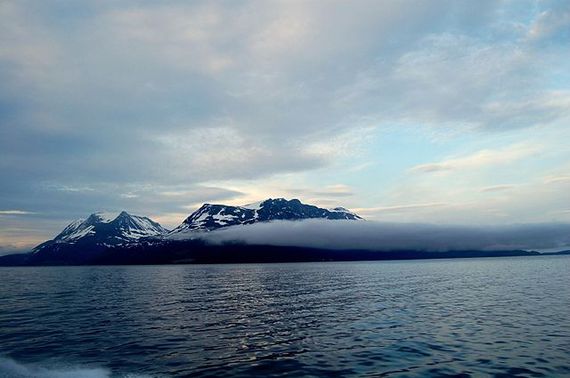Do methane bubbles in the Arctic signal a new level in our dangerous game with climate change?
I was passing through Paris' Charles de Gaulle airport last Sunday, on my way home with my two sons. We'd just spent the past 13 days in the Republic of Congo, visiting the Mbendjele forest people, a forest concession and a very fine national park, in order to experience life in Africa. It had been a great experience, made more special by the absence of technology: No social media in the forest.
Arriving back in Paris after our overnight flight from Brazzaville, I did look at Twitter and immediately spotted a post that I'd been dreading seeing for years. Scientists were reporting that methane was bubbling up from the Arctic sea floor. Methane is 20 times worse for the Earth's climate than CO over a 100-year period, and experts have long forecast really wicked feedback loops likely to kick in and cause runaway climate change if Arctic sea-floor methane were released. "Fingers crossed no," I'd always hoped, but here it was, real evidence that it might now be starting. Ocean-floor methane hits climate-change fan.
View of the Norwegian coast from the Arctic Ocean, courtesy of Vinay Deep
At the same time I saw tweets and a number of articles about the terrible Ebola epidemic taking so many lives across West Africa. The whole time we were in the Congo, whenever we were within range of a wireless network, text messages from family and friends poured in urging us to be careful, to get out, even, to avoid Ebola.
A thousand deaths and growing is a terrible thing, particularly from such an evil disease, often transmitted by the close care we instinctively give when our loved ones or friends are ill. I felt relieved that the World Health Organization had declared it a global emergency, yet at the same time I couldn't stop myself from coming back, again and again, to those bloody methane bubbles, which had gone pretty much unreported.
If it takes a thousand deaths to create a global emergency around Ebola, how many deaths do we need for a global emergency around climate change?
We're already seeing death, grief and destruction from climate change: fierce storms, floods, droughts, fires, and water shortages, all causing death and despair for millions. Climate-change refugees are on the move, seeking new places to live. Ancient cultures and livelihoods have been abandoned and lost.
And now the methane.
After learning of the methane bubbles, widely published climatologist Jason Box tweeted that we're in trouble "[i]f even a small fraction of Arctic sea floor carbon is released to the atmosphere." He also wrote in a blog post:
The trajectory we're on is to awaken a runaway climate heating that will ravage global agricultural systems leading to mass famine, conflict. Sea level rise will be a small problem by comparison. We simply MUST lower atmospheric carbon emissions.
As always, though, there are other folks urging that we not jump to conclusions. Renowned climate scientist Gavin A. Schmidt told BillMoyers.com that it's not yet time to panic:
"The problem with a lot of this research is that we don't have a long baseline of observations. Therefore when scientists report a new observation, it's impossible to tell whether it has always been there or whether it is genuinely new," he wrote. "That goes for these observations in particular."
He explained that during two periods in the "relatively recent" past -- first in the Early Holocene, six to eight thousand years ago, and then in the Eemian, 125,000 years ago -- the Arctic was warmer than it is now due to "wobbles in the Earth's orbit." Ice core records show that during those warmer periods, the Earth did not release large amounts of methane.
Because the Arctic is not as warm now as it was then, Schmidt wrote, we are not yet at the point where we should expect the Arctic's frozen methane deposits to melt.
That's hugely reassuring, but I still find myself wondering when it will be time to panic and if, having reached for the button, it'll be too late because we'll have long before been locked into inevitable change. My concern is that we will only see real and meaningful action on climate change when despair at its consequences reach some as-yet-unknown, terrible threshold. Mass famine and conflict don't sound like fun.
So yes, I despair. Mostly I despair that I can't share my despair with others, that it too might be contagious. It's an odd thing to wish despair on others, but I do so only out of a sense of hope, for it is true that hope can spring from despair, and humans really do have a long history of achieving extraordinary things, impossible change, in the face of the deepest, darkest despair. We need that despair, and we need it now. If I could share that despair by touch -- a loving touch -- so that it could spread, might we see people the world over getting low and down before rising again to shout, "We don't accept that future, and we're doing to do something about it now!"?
As I reflect on that methane bubbling up, unseen in the faraway Arctic, I yearn for that despair. I'm a positive person, but if the path to hope and action lies in despair, then give it to me. I want it now, and I want a sufficient body of others to feel it too, so that we get action now. So I reach across and gently touch the shoulders of my boys, too young to do too much, and not yet old enough to understand that despair is a good thing. They don't know what I'm thinking, but they smile back at me.
"Great trip to the forest, Dad."
And we continue to fly home.
